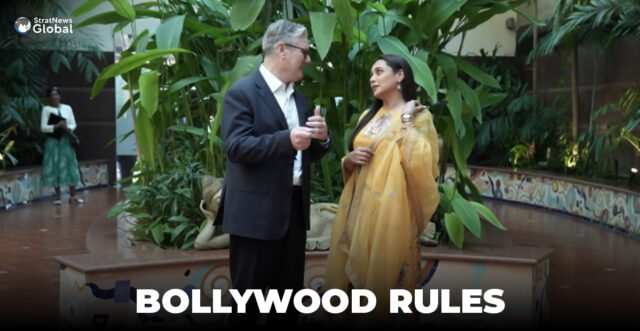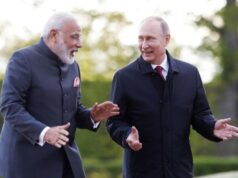The United Kingdom and India are set to strengthen their cultural and creative partnership with three major Bollywood films confirmed to be shot across the UK beginning in 2026.
The announcement was made by UK Prime Minister Keir Starmer during his visit to Yash Raj Studios in Mumbai, marking a new phase in the two countries’ longstanding cinematic and cultural collaboration.
The films will be produced by Yash Raj Films (YRF), one of India’s largest and most successful studios, and are expected to create more than 3,000 jobs while driving significant investment into local UK economies. The partnership reflects a growing effort to deepen cooperation between the two countries across film, music, literature, theatre, and other creative industries.
YRF’s decision to return to the UK after an eight-year gap underscores both the historical ties and the commercial advantages of filming there. “The UK has been an important part of our journey, and we have shot some of our most loved films there,” said Akshaye Widhani, CEO of YRF. “As we return to film in the UK, we also see this as a way to bring our creative industries closer. We are excited about what this renewed collaboration can offer to both sides.”
YRF is simultaneously developing Come Fall in Love, an English-language musical adaptation of Dilwale Dulhania Le Jayenge, in the UK. The stage production aims to introduce Indian storytelling to broader international audiences, bridging cultural traditions through performance.
Prime Minister Keir Starmer, who visited Yash Raj Studios accompanied by delegates from the British Film Institute (BFI), the British Film Commission, Pinewood Studios, Elstree Studios, and Civic Studios, described the move as emblematic of the UK’s creative ambition. “Bollywood is back in Britain, and with it comes jobs, opportunity, and cultural collaboration,” he said. “This is a clear example of how our creative ties with India are creating real outcomes, both economically and culturally.”
The announcement forms part of the Programme of Cultural Cooperation 2025, a government-to-government framework designed to expand partnerships between UK and Indian institutions in areas such as museums, heritage, publishing, and performing arts. The framework supports touring exhibitions, artist residencies, and training exchanges, offering opportunities for collaboration and skill development among younger professionals in both countries.
An updated Film Co-Production Framework complements this initiative by allowing producers from India and the UK to access production incentives and financial benefits in both countries. The mechanism encourages the sharing of expertise in post-production, visual effects, and design, helping stories travel more fluidly across markets and platforms. It also aligns with both governments’ efforts to boost creative economies through soft power diplomacy and cultural export.
According to the UK government, the creative industries contribute more than £12 billion to the British economy annually and support around 90,000 jobs. The new wave of Bollywood productions is expected to add further momentum to this sector, especially in regional economies that host filming locations.
Industry leaders have welcomed the renewed partnership. “India and the UK have deep connections through film, and this cooperation creates opportunities for both countries to benefit culturally and economically. These productions can help bring new audiences together and support industry growth on both sides,” said Ben Roberts, CEO of the British Film Institute.
“Working with studios like Yash Raj Films helps build creative partnerships that are grounded in shared experience. This opens the door to further cooperation in areas like post-production, VFX, and technical training,” added Adrian Wootton, CEO of the British Film Commission.
Starmer’s India visit — his first since taking office — is part of a broader trade mission aimed at expanding ties in business, education, and technology, in addition to culture and film. For both governments, the creative sector is increasingly seen as an instrument of diplomacy, economic growth, and people-to-people engagement.
The cultural relationship between India and the UK extends well beyond film. The Indian diaspora, which makes up about 2.6% of the UK population, has long contributed to the country’s social, political, and cultural life. More than 65,000 UK-based companies are owned by members of the Indian diaspora, playing a vital role in job creation and local economies. This community has also served as a bridge between the two nations’ creative industries, supporting cultural exchange and shared narratives.
Lisa Nandy, the UK’s Secretary of State for Culture, described the Bollywood partnership as a natural continuation of the two nations’ creative alignment. “Both countries have strong creative sectors and strong connections through people and shared stories,” she said. “Producing Bollywood films in the UK is a natural next step. It supports jobs, gives audiences more to enjoy, and builds on the creative partnerships we’ve been developing.”
Anushka Shah, CEO of Civic Studios — a production company operating in both countries — highlighted the growing appetite for storytelling that crosses borders and tackles shared global issues. “As a company with roots in both countries, we see great value in stories that connect communities across borders,” she said. “We’re especially excited to work on films that address themes that matter globally.”
The deepening collaboration between the UK and Indian film sectors reflects a broader recognition of cultural industries as powerful vehicles for international engagement. For decades, Bollywood has used the UK’s landscapes and architecture as cinematic backdrops, while British cinema and theatre have found growing audiences in India. What began as location-based cooperation has now evolved into a structured partnership that combines storytelling, commerce, and policy.
By facilitating new productions, expanding creative frameworks, and fostering artistic exchange, both countries aim to ensure that cultural cooperation becomes a sustained driver of growth.
As Starmer’s announcement demonstrated, this is not just about the return of Bollywood to Britain but about reinforcing the creative and economic bond between two countries with a shared history and a shared vision for the future of global storytelling.





